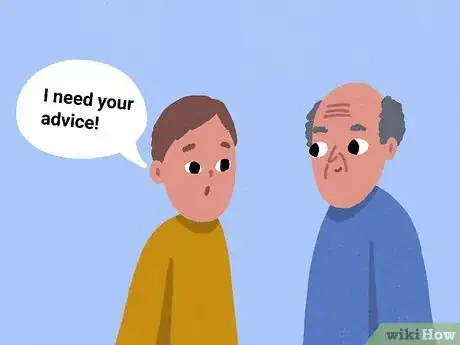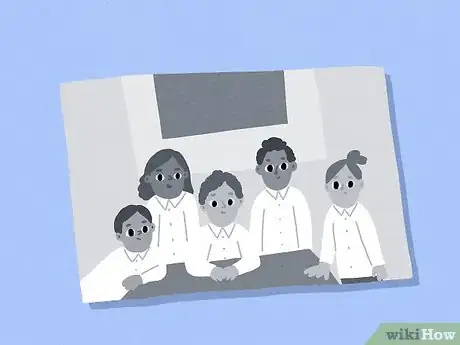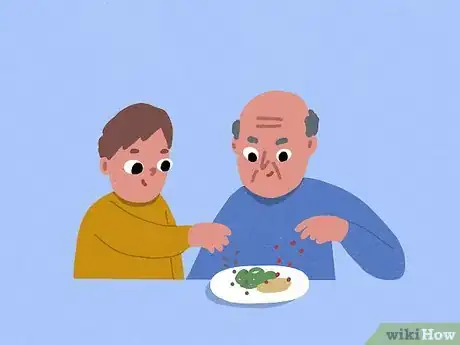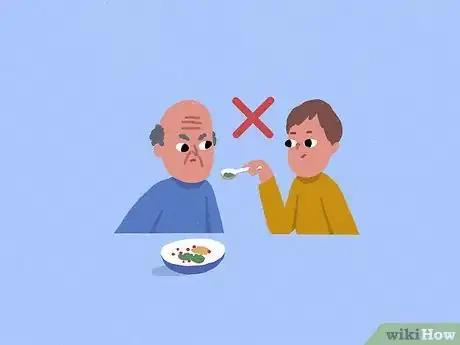This article was co-authored by Wits End Parenting and by wikiHow staff writer, Hunter Rising. Wits End Parenting is a parent-coaching practice based in Berkeley, California specializing in strong-willed, “spirited” children with impulsivity, emotional volatility, difficulty “listening,” defiance, and aggression. Wits End Parenting's counselors incorporate positive discipline that is tailored to each child’s temperament while also providing long-term results, freeing parents from the need to continually re-invent their discipline strategies.
There are 10 references cited in this article, which can be found at the bottom of the page.
wikiHow marks an article as reader-approved once it receives enough positive feedback. In this case, 87% of readers who voted found the article helpful, earning it our reader-approved status.
This article has been viewed 324,232 times.
Have you ever wanted to bond with someone older than you, but you aren’t quite sure where to start? Even though you’re from different generations, you can still connect with your elders by giving them the respect they deserve. We know it can be a little challenging to find something you have in common, but there are a lot of things you can do to show how much you value them. Keep reading to learn some different ways to have respectful conversations and spend time with your elders so you’re able to build a meaningful connection!
Steps
Warnings
- Avoid speaking to your elders like they’re children since it comes across as condescending or patronizing.[17]⧼thumbs_response⧽
References
- ↑ https://www.bayviewhealthcare.org/9-ways-honor-respect-elders/
- ↑ http://www.sfu.ca/olc/blog/co-op/10-tips-working-seniors
- ↑ https://www.ncbi.nlm.nih.gov/pmc/articles/PMC3110652/
- ↑ https://www.agingcare.com/articles/communication-techniques-to-deal-with-elderly-parents-138454.htm
- ↑ https://www.nytimes.com/2012/01/10/health/10-things-to-ask-when-seeking-life-lessons.html
- ↑ https://thehill.com/opinion/civil-rights/387383-respect-your-elders-is-a-lot-more-than-a-banal-platitude
- ↑ https://www.bayviewhealthcare.org/9-ways-honor-respect-elders/
- ↑ https://www.bayviewhealthcare.org/9-ways-honor-respect-elders/
- ↑ https://stdominicvillage.org/news/respecting-our-elders-by-robbie-bradford-rn-director-of-nursing
- ↑ Wits End Parenting. Parenting Specialists. Expert Interview. 5 March 2020.
- ↑ https://www.bayviewhealthcare.org/9-ways-honor-respect-elders/
- ↑ https://madisonparktimes.com/Content/Default/Breaking-News/Article/AGING-WITH-CARE-Respect-the-traditions-special-needs-of-the-elderly/-3/364/29756
- ↑ https://www.jems.com/patient-care/respect-your-elders/
- ↑ http://www.sfu.ca/olc/blog/co-op/10-tips-working-seniors
- ↑ https://www.bayviewhealthcare.org/9-ways-honor-respect-elders/
- ↑ https://www.agingcare.com/articles/communication-techniques-to-deal-with-elderly-parents-138454.htm
- ↑ https://www.agingcare.com/articles/communication-techniques-to-deal-with-elderly-parents-138454.htm
About This Article
Even though older people might seem very different to you, it’s important to show them respect and kindness. If you see an older person struggling with something, like opening a door, crossing the road, or carrying their shopping, lend them a helping hand. Always be polite with your elders and avoid using slang they might not understand. A lot of older people live at a slower pace due to their health and lifestyle, so try not to rush them or talk too fast. Don’t take it personally if they have outdated views. Instead, try to understand their perspective and calmly ask them why they think those things. If you have elderly family, keep in touch with them to see how they’re doing and show them you care. For more tips from our co-author, including how to have a good conversation with an older person, read on!









































































